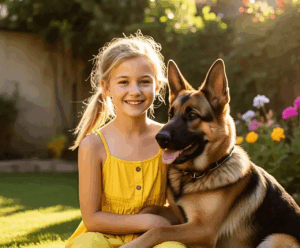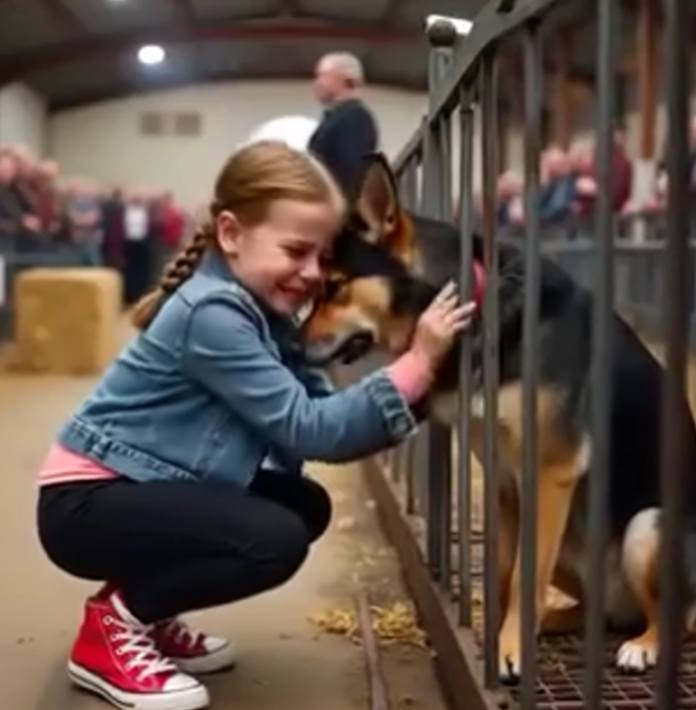The county fairgrounds in Willow Creek always felt too loud, sticky, and sprawling for someone as small and silent as Lily Parker. The summer sun pressed heavy on the gravel, turning every breath into something thick and bright. Carnival rides hummed behind the livestock barns, hawkers shouted about kettle corn and raffle tickets, and the distant clang of a hammer echoed from the main pavilion where the day’s biggest event was about to unfold.
Lily was eight, but she hadn’t said a single word to anyone since last November—the day two officers in uniform came to the farmhouse and shattered her world. Her mother, Officer Hannah Parker, was gone. Killed in the line of duty. The newsprint had said it plainly: gone without hope or explanation.
Since then, Lily’s voice had retreated, hidden somewhere deep inside her where even she couldn’t reach it.
But this morning, something stirred. She woke before dawn with the familiar ache in her chest sharper than usual. Quietly, she reached for the dusty mason jar she’d been filling with coins for years—birthday dimes, lemonade stand quarters, and the silver dollars her mom used to slip her as a treat. She counted twice: fifty-two dollars and some loose change. She cradled the jar in her backpack and waited by the door.
Rachel, her mother’s wife, knelt beside her, eyes tired and dimmed, trying to talk her out of going. “Lily, baby, you don’t have to go to that auction. It won’t be what you want.”

Lily only shook her head, eyes fixed on the spot where Rachel’s wedding ring glinted in the morning light. The ring looked wrong now, too loose on a trembling hand.
Neil, Lily’s stepfather, hovered nervously in the background, fiddling with his phone. He didn’t know how to help since the funeral except to say things like, “You’ve got to move on, kiddo,” or “You can’t just stop living.” Sometimes Lily hated him for it. Sometimes she didn’t care enough to hate at all.
They drove in silence, Rachel’s old Subaru rattling down the county road, every bump sending a shiver through Lily’s arms. When they parked, Rachel leaned over. “Whatever happens, I love you, okay?”
Lily stared at her knees as the car door slammed. The smells of the fairground hit her all at once: popcorn, hay, sweat, and sunburned metal.
Inside the pavilion, people milled around wooden benches facing a small stage. A few police officers stood at the front, looking uncomfortable. On the left, a single metal crate sat beneath a handmade sign: Retired K9 Auction — Max.
There he was. Max. The last piece of her mother that felt real—not a memory, not a photograph. Max, with his muzzle grayed by time, eyes dark and sharp as ever. He sat as if he owned the place, but his tail barely twitched. His gaze swept the crowd once, then fixed on Lily. A tiny shiver ran through her.
For months, she’d only felt alive at night, whispering to Max through the fence behind the old station after everyone else had gone home. She told him things she couldn’t say to people—secrets, how much it hurt, how sometimes she still waited for her mom to walk back through the door. Max never answered, but he listened. That was enough.
A man in a starched blue suit called for attention, his voice too cheery today. “Folks, you’re getting a piece of Willow Creek history. Our very own Max, five years of service, retired after Officer Parker’s passing. He’s looking for a new home. Let’s show him some love, shall we?”
Lily gripped her piggy bank so hard the glass bit into her palms. Rachel put a gentle hand on her shoulder, but Lily pulled away.
She scanned the crowd. Most were curious locals who remembered her mother or liked a good show. But in the front row, she spotted two men who didn’t belong: Vince Harding, tall and silver-haired with a wolfish smile, owner of Harding Security—a name she’d seen on billboards with the slogan “Safety You Can Trust”—and Gerald “Jerry” Bennett, a rancher from the far side of the valley, his denim shirt stained, face sunburned and lined. Both watched Max with a hunger that made Lily’s stomach twist.
The auctioneer lifted the gavel. “Starting bid: $500. Do I hear $500?”
A man in a ball cap called out, “$500!”
Vince raised a single finger. “$1,000.”
Bennett barely hesitated. “$1,500.”
The numbers leapt higher, voices growing louder, the air thick with tension. Lily stepped forward just a little. The gavel hovered in the auctioneer’s hand. Her voice, so long unused, rose like a ghost in her throat.
“I… I want to bid,” she whispered.
The room fell silent.
The auctioneer looked at her with a softness that hurt. “Honey, what’s your bid?”
Lily held out the jar with both hands. “$52.16.”
Someone laughed—a sharp, ugly sound. Vince smirked. The auctioneer knelt, taking the jar as if it were something precious. “Thank you, sweetheart, but it’s not enough.”
Max let out a low, aching whine. The sound seemed to hang in the rafters, tugging at something deep inside everyone in the room.
Lily wanted to scream, to run, to do anything but stand there with everyone watching her fail. She turned to run, but Max barked once—sharp, commanding. The crowd hushed.
In that stillness, Lily realized she wasn’t just bidding for Max. She was bidding for the last piece of her mother she could touch—the only place she could pour the words she’d lost.
Outside, the sun kept shining. The fairground noises carried on, but inside the pavilion, everything narrowed down to a little girl, a jar of coins, and an old dog’s steady gaze. Both waited for the world to let them belong somewhere together.
The auction buzzed with uneasy whispers after Lily’s failed bid, but Max didn’t care about numbers or rules. He watched only her, as if he could see through every silence, every invisible wound she tried to hide.
Max wasn’t just any German Shepherd. Even sitting still, his presence filled the barn. Big, broad-shouldered, with a black saddle marking fading to tan around his face, ears alert and never drooping like old dogs sometimes do. His eyes held the kind of wisdom earned by watching everything and saying nothing.
People in Willow Creek still remembered stories about Max and Officer Hannah Parker. Some nights in the local diner, old-timers talked about the pair—how they could clear a block with a word, how Max once sniffed out a missing child in a blizzard, how he wouldn’t leave Hannah’s side not even for a treat. He’d run into burning barns, tracked fugitives through the woods, stood between danger and his partner with loyalty most folks only dreamed about.
But the story no one liked to talk about—the one Lily saw over and over in her dreams—was the day of Hannah’s funeral. The rain had come down in sheets, turning the grass around the cemetery into a sea of mud. The coffin, draped in an American flag, stood at the edge of an open grave. Officers saluted, faces locked in stone. Max sat next to the casket, silent, refusing to move. When they tried to lead him away, he braced his paws and growled—a low, trembling sound of protest that shattered the composure of every adult present.
In the end, they let him stay until the last cloud of earth had been patted down. Afterward, he walked home behind Lily and Rachel, step for step, as if someone had switched off the light inside him.
For weeks, Max lay in the backyard, nose pressed to Hannah’s old jacket. Neighbors said he was grieving. Lily understood better than anyone. He was waiting for a voice he’d never hear again.
Since then, Lily had found her voice only in secret hours after midnight. She’d sneak out to the fence behind the police station, where they kept Max since the department couldn’t figure out what to do with him. She’d sit in the grass, knees tucked to her chin, whispering into the darkness, “It still hurts. I miss her too. I wish he could come home.”
Max would inch closer, pressing his cold nose to her palm. It was the only time she felt almost whole in the dark. She could pretend her mother’s absence wasn’t permanent—just something that could be fixed if she found the right words.

But today, at the auction, everything felt wrong. Max, with his leash clipped to the iron crate, looked smaller somehow, like the world had shrunk him. The air was too bright, the people too loud, even the police officers looked ashamed.
The auctioneer cleared his throat, trying to move things along.
“Next bid—$2,000?”
Vince raised his hand smoothly. “$2,000.”
People whispered his name. Everyone knew Vince. His face was on local ads, always smiling about security systems and community partnerships. He had a gold watch, perfect teeth, and a handshake nobody trusted.
Jerry Bennett didn’t look at Vince. He stared at Max, then at Lily, jaw grinding like he was chewing on something bitter. “$2,500,” he growled.
Someone muttered, “Old man Bennett doesn’t even like dogs.” But Bennett ignored them, eyes fixed on Max as if he saw something nobody else could.
Lily squeezed between Rachel and Neil, hands clenched tight. Rachel brushed hair from her face, whispering, “It’s not fair, baby. It should be you.”
Neil tried to lighten the mood with a clumsy joke, but Lily glared at him, and he shut up fast.
The auction continued, the bids rising, the tension thickening, the story of a girl and her dog weaving quietly through the crowd. And somewhere in the middle of it all, a silent promise began to take root—a promise that sometimes, love is louder than any rule, braver than any fear, and stronger than any silence.
PLAY VIDEO:


